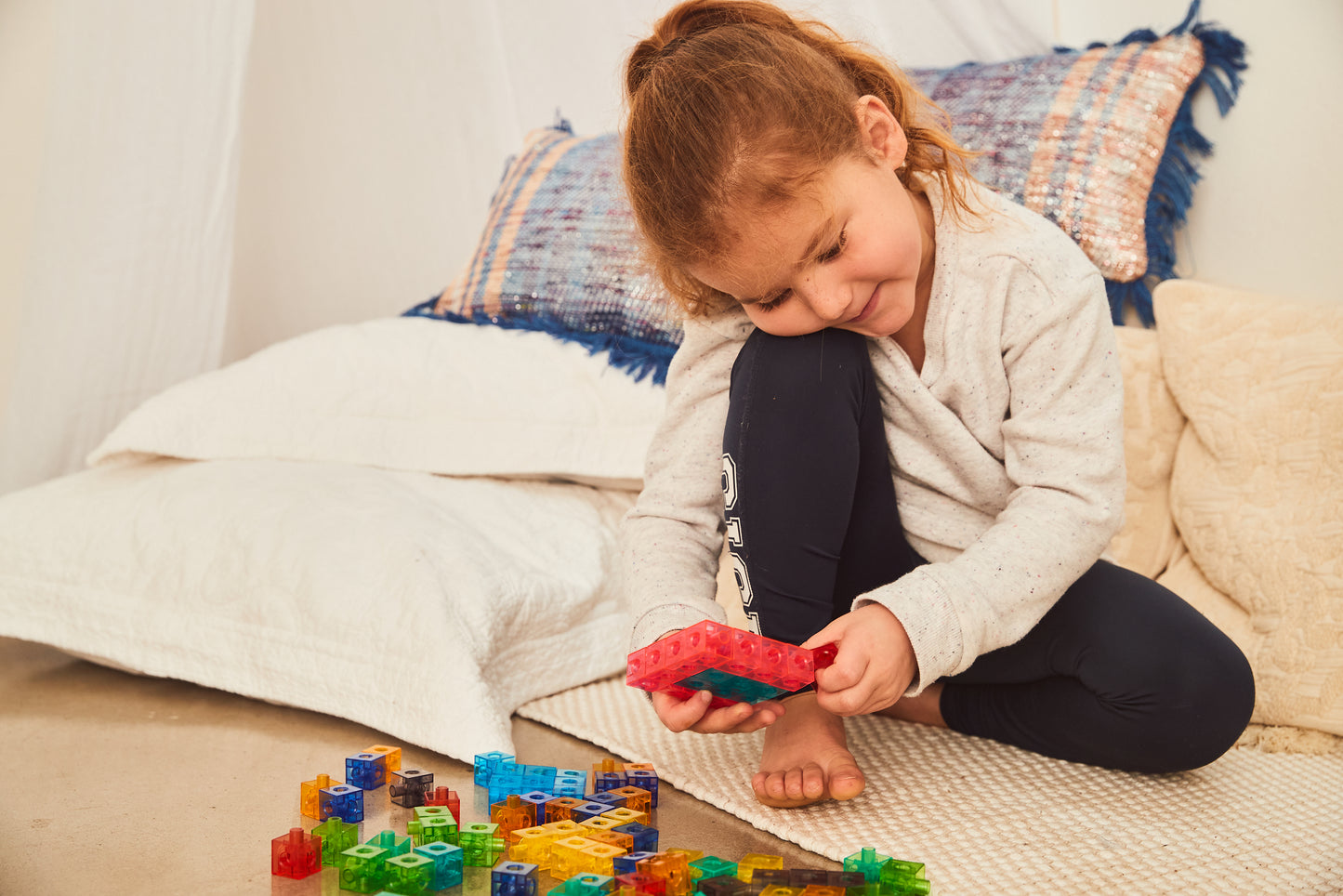
As parents and caregivers, we all want our children to grow up happy, resilient, and confident. One of the most powerful tools at our disposal to help our children develop these qualities is play. Play is not just a way for children to pass the time it is a critical part of their learning and growth.
At Edx Education, we advocate for play-based learning, not only through our innovative educational toys but also through our Play, Learn & Create podcast, which offers practical tips and insights for caregivers and educators alike.
Play, particularly when it involves high-quality educational toys, promotes social and emotional learning (SEL). SEL is all about helping children develop essential life skills such as self-awareness, emotional regulation, relationship-building, and decision-making.
With the right tools, you can make learning these skills fun and engaging for your children. In this blog, we’ll explore how some of our favourite toys like Rainbow Pebbles®, MyGears®, Math Cubes, Fidget Cubes, and balance path can support your child's SEL development.
Building Self-Awareness and a Growth Mindset
Self-awareness is the foundation of SEL. It involves understanding one’s emotions, strengths, and areas for growth. A growth mindset is an attitude that helps children view challenges as opportunities for learning rather than setbacks. The process of playing with toys like Math Cubes can foster self-awareness in young children. For instance, when children are engaged in building patterns or solving problems using Math Cubes, they begin to understand their capabilities, learn from mistakes, and experience the joy of mastering a challenge.
A growth mindset is nurtured when children realise that their effort leads to improvement. Even when they struggle to complete a structure with MyGears® or stack Rainbow Pebbles® in a tricky balance, they are learning that persistence is key. Encouraging your child to talk about how they feel when they succeed or struggle can further enhance self-awareness and emotional regulation. The process of building, dismantling, and rebuilding also fosters resilience, teaching them that failure is just part of the path to mastery.
Emotion Regulation Through Play
Emotional regulation knowing how to manage big feelings is another critical SEL skill. Play can be an effective way to practice this. For example, Fidget Cubes are designed to engage a child’s sense of touch, helping them manage feelings of anxiety or restlessness. The repetitive movements involved in using a Fidget Cube can help children calm down when they are feeling overwhelmed. These tactile toys are perfect for moments when your child needs a little sensory input to regain focus and control over their emotions.
Balance beams, another great tool for play-based learning, not only develop physical coordination but also help children manage frustration. Walking on a balance beam can be challenging for young children, but as they practice, they learn to steady themselves—both physically and emotionally. This helps children develop patience and the ability to stay calm when faced with difficulties.
Building Empathy and Social Skills
Children’s ability to understand and relate to others is central to social awareness and relationship-building. Simple activities, such as playing with Rainbow Pebbles®, offer opportunities to practice empathy and cooperation. For example, when children work together to create patterns or build structures, they learn to share, take turns, and appreciate others' ideas.
You can also practice SEL skills during family time with activities like “Emotion Charades,” where children act out different feelings using their facial expressions and body language. Games like these, paired with the use of open-ended toys such as MyGears®, promote teamwork and conversation, which are critical for developing social skills.
Encouraging Responsible Decision-Making
Responsible decision-making is the ability to make thoughtful, well-considered choices. Toys like MyGears® and Math Cubes are perfect for fostering this skill. When children engage in building activities, they have to plan, strategize, and sometimes adapt their approach. For example, if their gear system doesn’t work the first time, they must decide how to fix it. This process teaches them how to think through consequences and evaluate different options—a critical component of responsible decision-making.
A fun alternative SEL game you can try is "Emotion Sculptors." In this game, children use modelling clay (or any building material) to sculpt a face or figure that expresses a particular emotion—without saying what the emotion is. The other participants then try to guess what the emotion is based on the facial expressions or body language of the sculpture.
This game helps children explore the subtle ways emotions are expressed and sharpens their ability to recognize emotions in others. After each round, you can talk about how different feelings look and how they might feel inside, fostering emotional understanding and empathy.
Mindfulness and SEL
Mindfulness is another important aspect of SEL. It encourages children to be present in the moment and fully aware of their surroundings. This can be incorporated into daily activities like using sensory toys. For example, when children are focused on building with Math Cubes or balancing with Rainbow Pebbles®, they are practising mindfulness by being fully immersed in the task at hand.
Mindfulness practices help children become more aware of their feelings and behaviours. Over time, they become better at managing their thoughts and emotions, which contributes to overall well-being.
Let’s Play, Learn & Create
At Edx Education, we believe that play is the best way for children to develop the social and emotional skills they need to thrive. By incorporating our educational toys, such as Rainbow Pebbles®, MyGears®, Math Cubes, and Fidget Cubes, into your child’s daily routine, you can create opportunities for them to learn and grow through play. And don’t forget to tune in to our Play, Learn & Create podcast for more insights on how to support your child’s development through play.
Play is powerful—let's harness it to help our children grow into happy, resilient, and empathetic individuals.
